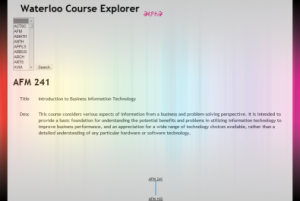Can you imagine anything useful coming out of this line of code?
prereqPattern='''([A-Z]{2,5} \d{3}/[A-Z]{2,5} \d{3}\s*and\s*[A-Z]{2,5} \d{3}/[A-Z]{2,5} \d{3})|([A-Z]{2,5} \d{3}\s*and\s*\(*[A-Z]{2,5} \d{3}\)*)|(\)\s*and\s*\()|(One of [A-Z]{2,5} \d{3}\s*[, or\d{3}]*;|[A-Z]{2,5} \d{3}[, \d{3}]*;|.*,\s*[A-Z]{2,5} \d{3}.*;|[A-Z]{2,5} \d{3} or [A-Z]{2,5} \d{3}|[A-Z]{2,5} \d{3} or \d{3}|[A-Z]{2,5} \d{3})'''
I can, because I’ve seen it. Here’s a small slice:
MATH 137 or 147
ACTSC 231, STAT 230 or 240
MATH 136 or 146
ACTSC 232
ACTSC 371
AFM 272;ACTSC 291
STAT 330, 333
STAT 330, 333
ACTSC 331, STAT 330
AFM 372;ACTSC 391;ACTSC 231;ACTSC 231 and BUS 393;STAT 330;STAT 334
AFM 372;ACTSC 391;ACTSC 231;ACTSC 231 and BUS 393;STAT 333 or 334
ACTSC 331
AFM 101 or BUS 227
AFM 101
A master piece at its time, and quite decent to maintain with the documentation:
'CS 134 or 145 or a mark of 60% or higher in 136 or 138; Honours Mathematics or Software Engineering students only.'
'([A-Z]{2,5} \d{3}) or (\d{3})*'
('CS 134', '145')
'One of CS 134, 136, 138, 145; Computer Science students only.'
'([A-Z]{2,5} \d{3})([, \d{3}]*;)'
('CS 134', ', 136, 138, 145;')
'Computer Science students only.'
'(\D* students only)'
'Computer Science students only'
'CS 350 or ECE 354'
'([A-Z]{2,5} \d{3}) or ([A-Z]{2,5} \d{3})*'
('CS 350', 'ECE 354')
'CM 339/CS 341 or CS 350'
'([A-Z]{2,5} \d{3})/([A-Z]{2,5} \d{3})( or [A-Z]{2,5} \d{3})*'
('CM 339', 'CS 341', ' or CS 350')
'DAC 201/ENGL 203 and DAC 202/ENGL 204'
'([A-Z]{2,5} \d{3})/([A-Z]{2,5} \d{3}).*([A-Z]{2,5} \d{3})/([A-Z]{2,5} \d{3})*'
('DAC 201', 'ENGL 203', 'AC 202', 'ENGL 204')
And a light comes through. There is a better way, better than I ever imagined. In fact, the ugly phase of evolution comes before the flowering. A metaphor for this would be the pollution during industrialization and a bloom of clean industries following it due to the emphasis on knowledge rather than machine labor.
Simply pass on the parenthesis in the lexer and rewrite the grammar so that it can see more of the input before having to make a decision for shift/reduce conflicts. This is similar to using a parser with more lookahead, an oracle that sees infinitely many steps ahead.
Yet, no matter how sweet the code,
it is time to part ways.
What comes next,
no one knows.
This age is past,
and the ground is laid for the next one.
